 Petzlover
Petzlover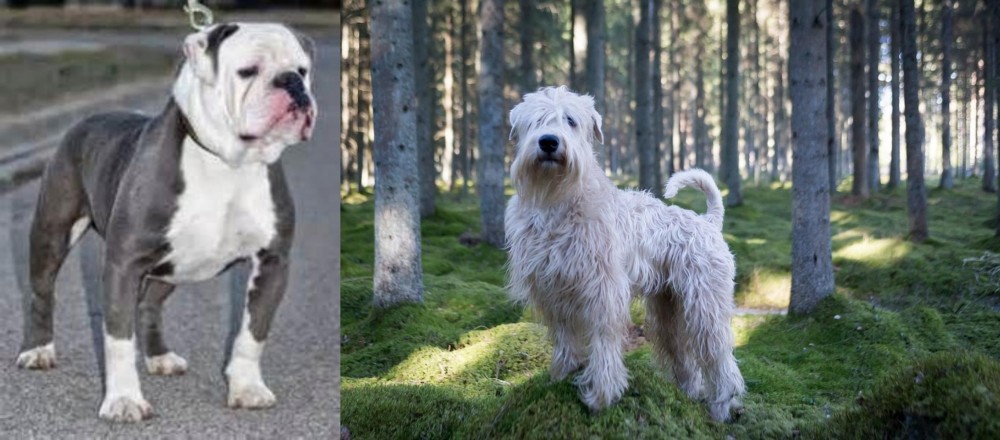 Both Old English Bulldog and Soft-Coated Wheaten Terrier are originated from United Kingdom. Old English Bulldog may grow 10 cm / 3 inches shorter than Soft-Coated Wheaten Terrier. Both Old English Bulldog and Soft-Coated Wheaten Terrier are having almost same weight. Both Old English Bulldog and Soft-Coated Wheaten Terrier has almost same life span. Both Old English Bulldog and Soft-Coated Wheaten Terrier has almost same litter size. Old English Bulldog requires Low Maintenance. But Soft-Coated Wheaten Terrier requires Moderate Maintenance
Both Old English Bulldog and Soft-Coated Wheaten Terrier are originated from United Kingdom. Old English Bulldog may grow 10 cm / 3 inches shorter than Soft-Coated Wheaten Terrier. Both Old English Bulldog and Soft-Coated Wheaten Terrier are having almost same weight. Both Old English Bulldog and Soft-Coated Wheaten Terrier has almost same life span. Both Old English Bulldog and Soft-Coated Wheaten Terrier has almost same litter size. Old English Bulldog requires Low Maintenance. But Soft-Coated Wheaten Terrier requires Moderate Maintenance
 This is an extinct dog breed. It is believed that the dog came from ancient dogs such as the old Mastiff. The Old English Bulldog was the original English Bulldog but quite different from the modern variety, with longer legs as well as a longer muzzle and more aggressive.
This is an extinct dog breed. It is believed that the dog came from ancient dogs such as the old Mastiff. The Old English Bulldog was the original English Bulldog but quite different from the modern variety, with longer legs as well as a longer muzzle and more aggressive.
It is believed that the Old English Bulldog was the ancestor to many breeds and there have been efforts to recreate the Old English Bulldog, bringing about quite a few new Bulldog breeds. Records are actually unclear as to its origins and when you read up on its ancestry, you see that a lot of the information is conflicting.
A number of breeders have attempted to recreate this extinct breed with some success, but it must be borne in mind that these recreations aren’t the Old English Bulldog, as the genetics of it are extinct.
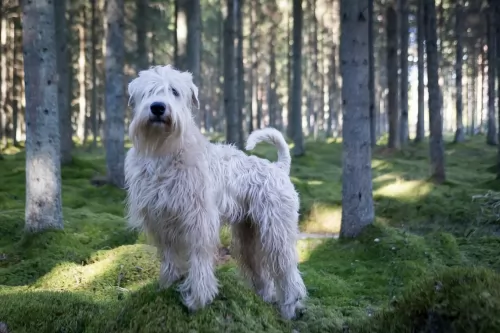 This wheaten colored terrier hails from Ireland. Although the Wheaten has been around for a long time, it was in 1937 that he was recognized as a breed in Ireland.
This wheaten colored terrier hails from Ireland. Although the Wheaten has been around for a long time, it was in 1937 that he was recognized as a breed in Ireland.
The British Kennel Club also recognized the Wheaten and the dog was also exported to the United States. Serious interest started being shown for the Terrier in the 1970s. It was in 1973 that they were recognised by the American Kennel Club.
 This dog is extinct but he used to be a fairly broadly set, muscular dog, taller than the bulldog of today.
This dog is extinct but he used to be a fairly broadly set, muscular dog, taller than the bulldog of today.
The average height of this dog was 36 – 40cm, weighing in at about 18 to 22kg. One of the dog’s more noticeable characteristics was his lower jaw that projected quite a bit in front of the upper jaw. The dog was deep-chested, the head broad and the nose and muzzle short.
The breed was developed for bull baiting, but in England, with the adoption of the Act of cruelty to animals, there was a decline in the interest for the dog, leading to it becoming extinct. There are old paintings from the 1800s and one such painting, Crib and Rosa, gives an idea of the form and size of the Old English Bulldog.
The regular English Bulldog today is often confused with the Old English Bulldog but it is a far sweeter breed than the Old English Bulldog. It is believed that the Old English Bulldog was an aggressive dog, bred to be this way because of his role in bull baiting.
As a pet though, brought up as a companion, he no doubt would have made a loving, loyal pet.
 The Wheaten is a medium sized dog standing at between 43 and 50cm and weighing between 13 and 20kg both male and female. The coat of the dog is soft, silky and wavy to even curly and is a wheaten to ginger color.
The Wheaten is a medium sized dog standing at between 43 and 50cm and weighing between 13 and 20kg both male and female. The coat of the dog is soft, silky and wavy to even curly and is a wheaten to ginger color.
The coat of the puppy is dark but as he grows up it changes into the wheaten color although the ears may be a dark brown color. Pet owners like that the Wheaten is a very low shedding dog.
Playful, social and friendly, the Wheaten has always been put to good use on the farm. These days he is pet and companion. He is energetic and playful so children love having him around.
He is slightly more hyper and energetic than other Terrier breeds so will require a good dose of exercise.
He is smart and strong willed, and training and socialization turns him into an amicable pet to have around, so much so that he is sought after as a therapy-dog.
They’re easy-going dogs with no aggression issues but they still make great watch dogs and want to do whatever it takes to look after- and protect their human family.
 Not much information is available on this extinct dog. Perhaps because of his history of being used for bull baiting, he wouldn’t have made a good family pet as he was too aggressive. He wouldn't have been a good choice for a first time dog owner and he wouldn't have been a good choice of pet for children.
Not much information is available on this extinct dog. Perhaps because of his history of being used for bull baiting, he wouldn’t have made a good family pet as he was too aggressive. He wouldn't have been a good choice for a first time dog owner and he wouldn't have been a good choice of pet for children.
He was possibly owned by a single person who made money from him. Small wonder then that he became extinct when he was no longer required for this role.
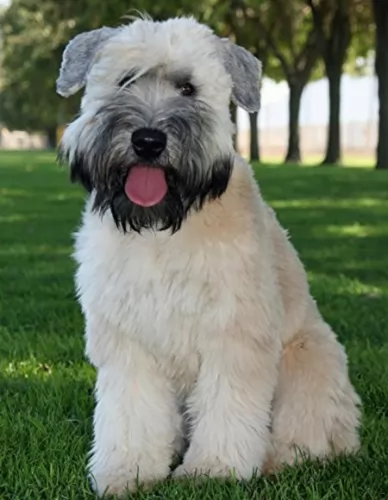 The Soft Coated Wheaten Terrier has always made an excellent farm dog, but today he is more suited as pet and companion.
The Soft Coated Wheaten Terrier has always made an excellent farm dog, but today he is more suited as pet and companion.
He adapts easily to life in the city or the countryside. Wherever he is, he will need his exercise. He also longs to be an active part of his human family, and then he’s happy, lively, social and friendly and is a great playmate for children.
 This dog, although extinct would have battled with common dog illnesses that can still be seen in the modern bulldog today.
This dog, although extinct would have battled with common dog illnesses that can still be seen in the modern bulldog today.
Brachycephalic airway syndrome is all about upper airway abnormalities and can be quite a problem in your Old English Bulldog because of the shortened muzzle of these breeds. These particular dogs have a smaller upper jaw and an overcrowding of of teeth and you will see that effort is required to inhale. They breathe more easily through the mouth then the nose. They have noisy breathing, particularly during exercise and in hot weather.
Dogs have 3 eyelids, and cherry eye is the term used for prolapsed nictitating membrane, or the 3rd eyelid, when the eyelid comes out of place and you get a pink mass. It is a common condition found in Bulldogs, a genetic problem where surgical intervention or medicine may be recommended.
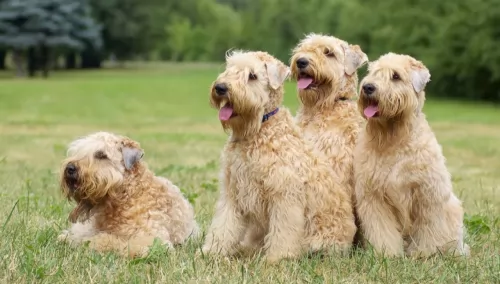 When you bring a Wheaten Terrier into your home, you’re not likely to have too many vet fees as he tends to be a healthy dog breed, being able to reach 13, 14 or 15 years of age with good care.
When you bring a Wheaten Terrier into your home, you’re not likely to have too many vet fees as he tends to be a healthy dog breed, being able to reach 13, 14 or 15 years of age with good care.
Look out for a dog ailment known as Protein-losing enteropathy (PLE). This is a condition where the dog isn’t able to properly absorb protein in the digestive tract, so that it is passed in their stools.
It can be fatal, but if caught early, some dietary changes can keep it under control.
Also, look out for inflammatory bowel disease. This disease occurs when the stomach of the dog has a large number of inflammatory cells which can change the lining of the digestive tract, preventing the normal absorption of food.
 If the Old English Bulldog were still around today, you would have cared for him like you would most other dogs -
If the Old English Bulldog were still around today, you would have cared for him like you would most other dogs -
Feed your Old English Bulldog puppy 4 times a day with high quality puppy food.
At 6 months of age you can be giving your young dog 2 meals a day.
Commercially manufactured food is fine if its a high quality one. Always check out the top 5 ingredients on the packaging – the first 2 should be protein or meat. Follow a simple, consistent diet to minimize symptoms. Your adult dog can have kibble and sometimes you can add in chopped boiled chicken, brown rice and vegetables such as sweet potatoes, carrots and spinach. A little bit of raw meat can also be added to the kibble once in a while. Never leave your dog without a constant supply of fresh, cool water.
Even though the dog is extinct, dog owners of that time would have had to watch their dogs for ticks and fleas and any of the common dog illnesses of that time.
The dog would have had some kind of grooming – a brush down a couple of times and he would have been checked for ear and eye infections.
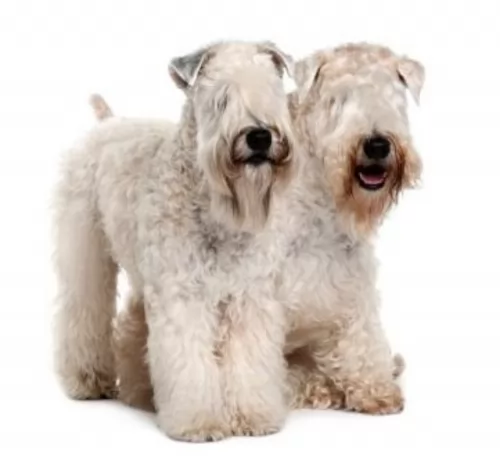 Brush your pet’s silky coat twice a week. Such a silky coat can get all tangled and matted. If you prefer, many people opt to rather have the Wheaten’s coat professionally clipped as then it is easier to handle. They like to have the hair clipped that hangs over the dog’s eyes.
Brush your pet’s silky coat twice a week. Such a silky coat can get all tangled and matted. If you prefer, many people opt to rather have the Wheaten’s coat professionally clipped as then it is easier to handle. They like to have the hair clipped that hangs over the dog’s eyes.
Other grooming tasks require you to check inside his ears for redness which could indicate an infection. Trim his nails and check him over for ticks and fleas.
Have your Wheatie trained and socialized as he is a stubborn dog breed and you want him to be well mannered and obedient.
Terriers like this are energetic dogs and he is going to need exercise every day. A walk for a dog is always a welcome experience as it gives him the opportunity to sniff around and pick up new smells. Play ball- or frisbee games with him as this can tire him out a bit.
If your dog shows signs of illness, get him to the vet. He is such a feisty dog that it can be unbearable to see him out of sorts.
Terriers are energetic dogs so if you feed your dog one of the commercial dog foods, make sure the label indicates what food it is. This is because the foods are manufactured according to the type of dog it is, its age, size and energy levels.
Always try and go for the high quality foods which don’t have all those unhealthy ingredients in them. Try to include some home-made food – nothing exotic and spicy – just plain, wholesome food that won’t upset his stomach.
Boiled chicken, brown rice or pasta and spinach, sweet potatoes and carrots is super tasty and nutritious. You can chop it up and add it to your pet’s kibble twice a week.
Try and include a little bit of raw meat to his diet occasionally as this can go towards ensuring he doesn’t get skin diseases. Always ensure he has a constant supply of fresh, cool water available.